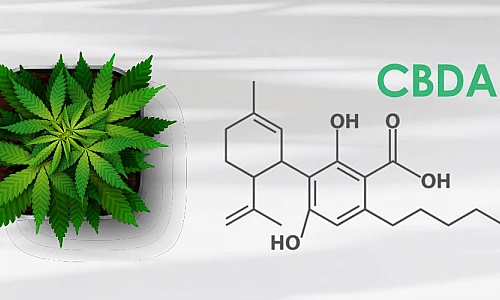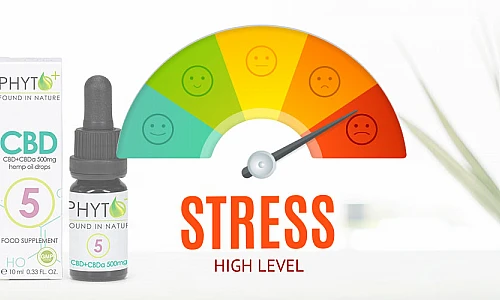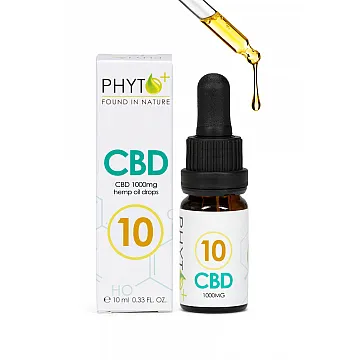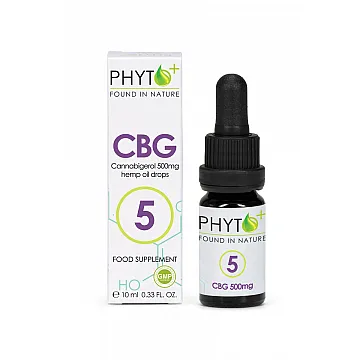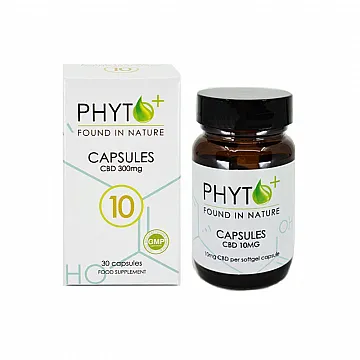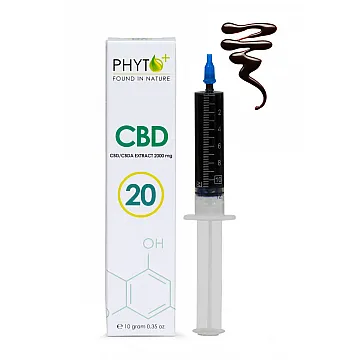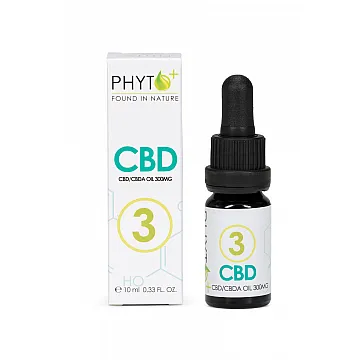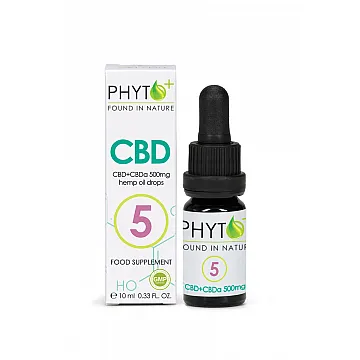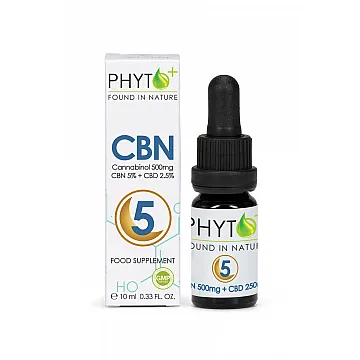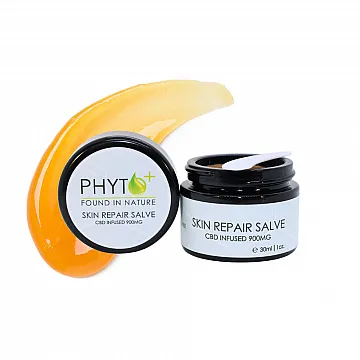
Nowadays, CBD oil is widely known. Due to many potential health benefits. CBD is used as an appetite stimulant, a sleep aid, a treatment for skin conditions such as eczema and psoriasis, pain relief, to prevent seizures, and much more.
We picked six key benefits to share with you. But first, we will briefly explain CBD oil and how it interacts with the human body.
So what is CBD oil?
CBD oil is a natural oil extracted from the hemp plant's flowers and leaves. It contains cannabidiol (CBD) CBG, CBN, terpenes, and flavonoids. CBD is known for its potential therapeutic benefits and is commonly used to treat various health conditions such as chronic pain, anxiety, depression, seizures, and more. CBD oil is often used as a natural alternative to prescription medications and is available in various forms, including oils, capsules, topicals, and cbd extract.
How does CBD oil work in the body?
CBD and other phytocannabinoids work with the endocannabinoid system. The endocannabinoid system is a complex cell-signaling system that is present in the human body and many other animals. It is responsible for regulating various physiological processes, including appetite, mood, pain, and sleep. The endocannabinoid system consists of three main components: endocannabinoids, receptors, and enzymes.
Endocannabinoids are naturally occurring compounds that are similar in structure to cannabinoids found in the cannabis plant (phytocannabinoids), such as CBD and THC. These compounds bind to specific receptors in the body, called CB1 and CB2 receptors, which are found throughout the brain and nervous system, as well as in other organs and tissues.
When endocannabinoids bind to these receptors, they help to regulate various functions, such as reducing inflammation, relieving pain, and promoting a sense of well-being. The enzymes in the endocannabinoid system are responsible for breaking down endocannabinoids once they have fulfilled their function.
Overall, the endocannabinoid system plays a crucial role in maintaining homeostasis, or balance, within the body. Dysfunction of the endocannabinoid system has been linked to various health conditions, including anxiety, depression, chronic pain, and autoimmune disorders.
THE BODY PRODUCES TWO RECEPTORS:
- CB1 receptors are present throughout the body, especially in the brain. They coordinate movement, emotions, pain, thinking, mood, appetite, memories, and other functions.
- CB2 receptors are more common in the immune system. They affect inflammation and pain.
THC attaches to CB1 receptors, but CBD stimulates these receptors so that the body produces its own cannabinoids, known as endocannabinoids.
In the image below you can see the two types of receptors CB1 (red) and CB2 (blue) throughout the human body.

Now that you have a general understanding of how CBD works in our body, we highlighted six key benefits of CBD oil from the many potential benefits that CBD is known for.
1. CBD can relieve pain
CBD has been studied for its potential to relieve various types of pain, including chronic pain, neuropathic pain, and inflammatory pain. It may also effectively reduce pain associated with conditions such as arthritis, multiple sclerosis, and muscle soreness.
CBD may work by reducing inflammation, a common cause of pain. It may also interact with serotonin receptors in the brain, which can help regulate pain perception and improve mood.
2. CBD could reduce anxiety and depression
CBD (cannabidiol) has been studied for its potential benefits in reducing anxiety and depression. It interacts with the endocannabinoid system, which regulates many physiological processes in the body, including mood and emotions.
One way that CBD oil may help reduce anxiety and depression is by affecting serotonin levels in the brain. Serotonin is a neurotransmitter that is associated with feelings of happiness and well-being. CBD has been shown to interact with the 5-HT1A receptor, which is involved in serotonin signaling.
Several studies have investigated the effects of CBD on anxiety and depression. One study found that CBD effectively reduced anxiety in people with social anxiety disorder. Another study found that CBD was effective in reducing symptoms of depression in animals.
3. CBD can alleviate cancer-related symptoms
CBD has been found to alleviate various cancer-related symptoms, including pain, nausea, and vomiting associated with chemotherapy. Some studies have also shown that CBD may have anti-tumor properties and could potentially slow the growth or even kill cancer cells, although more research is needed in this area.
CBD has been shown to be effective in managing cancer-related pain. In a study of cancer patients with moderate to severe pain, those who received a combination of CBD and THC (another compound found in cannabis) experienced significant pain relief compared to those who received a placebo.
CBD can also help alleviate chemotherapy-induced nausea and vomiting. In a study of cancer patients undergoing chemotherapy, those who received CBD in addition to their standard anti-nausea medication experienced a significant reduction in nausea and vomiting compared to those who received only the standard medication.
In addition, CBD may help improve sleep in cancer patients, which can be disrupted by pain, anxiety, and other symptoms. A study of cancer patients found that those who received a daily dose of CBD experienced improved sleep compared to those who received a placebo.
It's important to note that while CBD may help alleviate cancer-related symptoms, it should not replace conventional cancer treatments. CBD should be used in consultation with a healthcare provider as part of a comprehensive cancer treatment plan.
4. CBD may reduce acne
CBD has shown potential for reducing acne due to its anti-inflammatory properties and ability to regulate sebum production, an oily substance produced by the skin. Acne is often caused by inflammation and excessive sebum production; CBD has been shown to reduce both.
One study found that CBD may help reduce sebum production in the sebaceous glands, which could help prevent acne. Additionally, CBD has been shown to have anti-inflammatory effects, which can help to reduce the redness and swelling associated with acne.
> How can CBD help reduce acne
5. CBD might have neuroprotective properties
Studies suggest that CBD may have neuroprotective properties, meaning that it could potentially help protect the nervous system from damage and degeneration. CBD interacts with the endocannabinoid system, which plays a role in regulating various physiological processes, including those related to the nervous system.
In particular, CBD may be beneficial for conditions such as epilepsy, multiple sclerosis, and Parkinson's disease, which are characterized by neurodegeneration and neuroinflammation. Studies have shown that CBD can help reduce seizures in some people with epilepsy, and may also improve motor function and quality of life in people with Parkinson's disease.
In addition, some studies have found that CBD may have antioxidant and anti-inflammatory effects, which could help protect the nervous system from damage caused by oxidative stress and inflammation. However, more research is needed to fully understand the potential neuroprotective properties of CBD and how it may be used to treat neurological disorders.
6. CBD could benefit heart health
Some evidence suggests that CBD may benefit heart health by lowering blood pressure and reducing inflammation. High blood pressure can increase the risk of a range of cardiovascular problems, including heart attack, stroke, and metabolic syndrome. Studies have shown that CBD may be able to reduce blood pressure in both animal and human models.
CBD may also have anti-inflammatory properties that could benefit heart health. Inflammation is a key factor in the development of atherosclerosis, a condition where fatty plaques build up in the arteries, restricting blood flow and increasing the risk of heart disease.
However, more research is needed to fully understand CBD's potential benefits and risks for heart health. It is essential to consult with a healthcare provider before using CBD to treat any health condition.
Much more research is needed, but CBD can be a useful, natural, and non-toxic option for managing anxiety, insomnia, and chronic pain. Without sufficient high-quality evidence in human studies, we cannot yet determine effective doses. CBD oil is a product from nature, and every human body reacts differently. There are only guidelines, it is best to experiment yourself to find your personal dose. Always start with a very small dose and increase it every three days until you achieve the desired result.
CBD oil is currently only available as an unregulated dietary supplement. With the wide range of different CBD brands and concentrations, it is difficult to know precisely what you are buying.
Why buy Phyto Plus® CBD Oils?
First, we, Phyto Plus®, use high-quality, organic hemp plants to extract our CBD oils, ensuring our products are pure and free from harmful chemicals. Additionally, We use the "Clean Air" CO2 extraction method, a clean and environmentally friendly way to extract CBD oil.
Furthermore, we offer a wide range of CBD oil products to suit different needs and preferences, such as full-spectrum CBD oils, CBD capsules, powerful extracts, and skin care. At Phyto Plus®, we also provide clear and transparent information about our products, including lab test results and dosage recommendations.
Lastly, many customers worldwide have positive experiences with Phyto Plus® CBD oil products, particularly in managing pain, anxiety, and sleep issues. Overall, Phyto Plus® CBD oil products are a reliable and safe option for those looking to incorporate CBD into their wellness routine.
Note that...
Although there are more and more results from studies about Cannabidiol, there is still much to learn and research.
Always check with your doctor before starting a new dietary supplement regimen. Consult your doctor before use if you have a serious medical condition or use prescription medications.
Sources:
"Cannabis, Cannabinoids, and Sleep: a Review of the Literature" by Gates et al., published in Current Psychiatry Reports in 2017.
"Cannabidiol (CBD) as an Adjunctive Therapy in Cancer-Related Pain: A Double-Blind, Randomized, Placebo-Controlled Clinical Trial" by Dr. Ethan Russo, published in the Journal of Pain and Symptom Management in 2020.
"Cannabidiol in patients with treatment-resistant epilepsy: an open-label interventional trial" by Orrin Devinsky et al., published in The Lancet Neurology in 2016.
"Cannabidiol enhances the inhibitory effects of delta9-tetrahydrocannabinol on human glioblastoma cell proliferation and survival" by Marcu JP et al., published in Molecular Cancer Therapeutics in 2010.
"Cannabidiol inhibits lung cancer cell invasion and metastasis via intercellular adhesion molecule-1" by Ramer R et al., published in the FASEB Journal in 2012.
"Cannabinoids induce apoptosis of pancreatic tumor cells via endoplasmic reticulum stress-related genes" by Carracedo A et al., published in Cancer Research in 2006.
"Cannabidiol exerts sebostatic and antiinflammatory effects on human sebocytes." published in the Journal of Clinical Investigation in 2014.
"Cannabidiol induces rapid and sustained antidepressant-like effects through increased BDNF signaling and synaptogenesis in the prefrontal cortex" (2018) by Linge et al.
"Cannabidiol as a Potential Treatment for Anxiety Disorders" (2015) by Blessing et al.
"Cannabidiol in Anxiety and Sleep: A Large Case Series" (2019) by Shannon et al.
"Neurological Aspects of Medical Use of Cannabidiol" (2014) by Campos et al.


